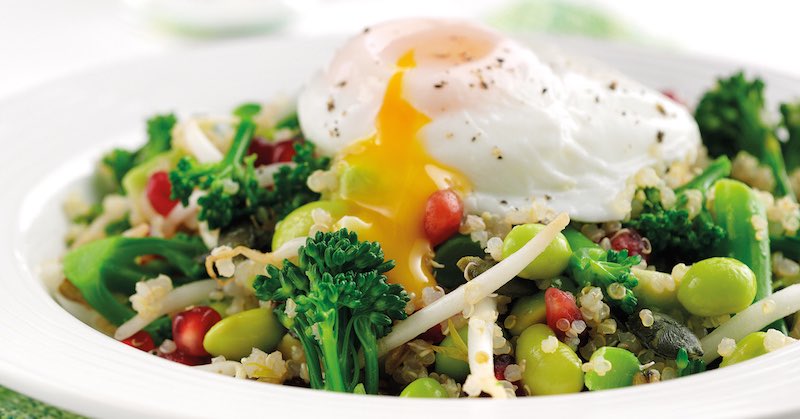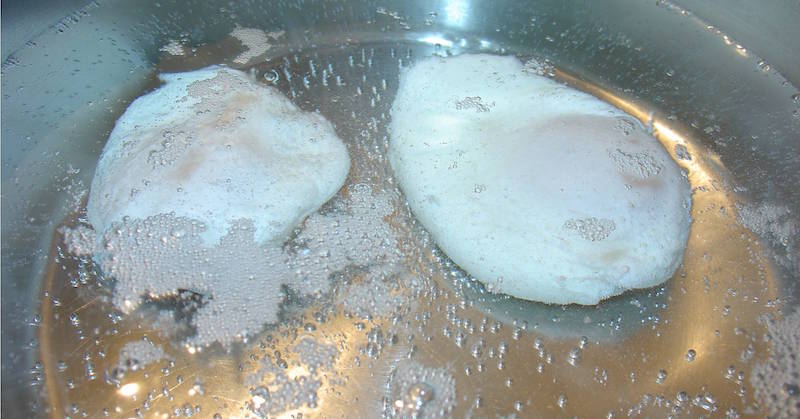Scrambling And Frying Eggs Oxidize The Nutrients, Prepare Your Eggs This Way Instead
Last updated on
A salad can make a great meal, but not all salads are created equal. Just because it has lettuce as its base or “salad” in its name doesn’t automatically make it healthy, and many salads at fast-food restaurants are examples of that.
You’re better off avoiding salads topped with fried meats (often sold as “crispy”), croutons, or tortilla strips (which are sometimes added to taco salads)… and you’ll also want to avoid most store-bought dressings—especially the low-fat and fat-free varieties.
A healthy salad must have a source of high-quality fats to help your body absorb its beneficial nutrients. You can get these from your dressing and also by selecting your toppings wisely. One of the best salad toppings of all? Eggs!
Eggs In Salad Helps Your Body Absorb Nutrients
When you eat a salad you want to absorb as many of the beneficial nutrients as you can. But some nutrients and antioxidants are fat-soluble, which means you must eat them with fat to properly absorb them.
A simple way to enhance your nutrient absorption is to add whole eggs to your salad (soft-boiled, hard-boiled or, preferably poached). When men added 1.5 to 3 eggs to their salads, they increased their absorption of lutein and zeaxanthin by four to five-fold.1
Other carotenoids, including beta-carotene and lutein, increased three to eight-fold compared to the no-egg salad. The researchers noted:
“…consuming cooked whole eggs is an effective way to enhance carotenoid absorption from other carotenoid-rich foods such as a raw mixed-vegetable salad.”
The men who added three eggs to their salad had higher levels of carotenoids in their system than men who added 1.5 eggs, but two eggs would probably be a happy medium for most people.
When I eat eggs in my salad, I typically use about four of them. Be sure you are consuming the yolk portion of the eggs. Egg whites alone won’t cut it, as it’s the fat in the yolk that’s responsible for the increased nutrient absorption.
Poaching: One of the Healthiest Ways to Prepare Eggs
Eggs are a phenomenal source of protein, fat, and other nutrients, including choline and the antioxidants lutein and zeaxanthin. They are so good for you that you can easily eat one dozen eggs per week, which is actually a simple and cost-effective way to add valuable nutrition to your diet—provided you cook them properly.
The best way to consume eggs, provided they come from a high-quality source, is to not cook them at all. Less “well done” eggs are vastly preferable, such as poached, soft-boiled, hard-boiled, or over easy with very runny yolks.
It’s important to consume egg yolks that are only lightly cooked, as the heat will damage many of the highly perishable nutrients in the yolk. Two raw egg yolks have antioxidant properties equivalent to half a serving of cranberries (25 grams) and almost twice as many as an apple.
But the antioxidant properties are reduced by about 50 percent when the eggs are fried or boiled, and reduced even more if they’re microwaved.2 Additionally, the cholesterol in the yolk can be oxidized with high temperatures, especially when it is in contact with the iron present in the whites and cooked, as in scrambled eggs, and such oxidation contributes to chronic inflammation in your body.
For this reason, scrambled eggs are one of the worst ways to prepare eggs if you want them to be healthy. Non-stick cookware may offgas dangerous fluoride vapors at temperatures as low as 325°F-400°F,3 I recommend avoiding it.
To poach eggs, you can cook them by dropping into a pot of barely simmering water, fewer bubbles means less agitation of water that can separate the egg. Crack the egg into a ramekin or small cup, then gently slide it into the water. Next, turn off the heat, set a timer to let them cook for three to five minutes. You can remove carefully from the pan with a slotted spoon.
Organic and Free-Range
Even before you master how to cook your eggs properly, it’s important to choose eggs from a high-quality source. Free-range or “pastured” organic eggs are far superior when it comes to nutrient content, while conventionally raised eggs are far more likely to be contaminated with disease-causing bacteria such as salmonella.
An egg is considered organic if the chicken was only fed organic food, which means it will not have accumulated high levels of pesticides from the grains (mostly GM corn) fed to typical chickens. Ideally, the chicken should have access to the outdoors where it can consume its natural diet.
Testing has confirmed that true free-range eggs are far more nutritious than commercially raised eggs, likely due to the differences in diet between free-ranging, pastured hens and commercially farmed hens.
In one egg-testing project, Mother Earth News compared the official US Department of Agriculture (USDA) nutrient data for commercial eggs with eggs from hens raised on pasture and found that the latter typically contains:4
- 2/3 times more vitamin A
- 2 times more omega-3 fatty acids
- 3 times more vitamin E
- 7 times more beta-carotene
If you’re purchasing your eggs from a supermarket, be aware that labels can be very deceptive. The definitions of “free-range” are such that the commercial egg industry can run industrial farm egg-laying facilities and still call them “free-range” eggs, despite the fact that the birds’ foraging conditions are far from what you’d call natural.
The key to finding truly free-range, pastured eggs is to buy your eggs locally. This is typically even preferable to organic eggs from the grocery store. If you live in an urban area, visiting the local health food stores is typically the quickest route to finding the high-quality local egg sources.
You can tell your eggs are free range or pastured by the color of the egg yolk. Foraged hens produce eggs with bright orange yolks. Dull, pale yellow yolks are a sure sign you’re getting eggs from caged hens that are not allowed to forage for their natural diet.
This article was originally published on Mercola.com. It is republished here with permission.
Some of the links I post on this site are affiliate links. If you go through them to make a purchase, I will earn a small commission (at no additional cost to you). However, note that I’m recommending these products because of their quality and that I have good experience using them, not because of the commission to be made.


































 JOIN OVER
JOIN OVER
Comments